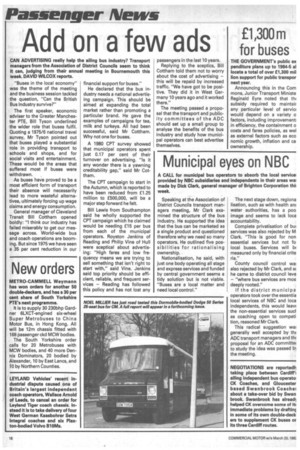Add on a few ads
Page 14

If you've noticed an error in this article please click here to report it so we can fix it.
CAN ADVERTISING really help the ailing bus industry? Transport managers from the Association of District Councils seem to think it can, judging from their annual meeting in Bournemouth this week. DAVID WILCOX reports.
"Buses in the local economy" was the theme of the meeting and the business session tackled the question, "Can the British Bus Industry survive?"
The first speaker, economic adviser to the Greater Manchester PTE, Bill Tyson underlined the wider role that buses fulfil. Quoting a 1975/6 national travel survey, Mr Tyson pointed out that buses played a substantial role in providing transport to schools and shops, and for social visits and entertainment. These would be the areas that suffered most if buses were withdrawn.
As buses have proved to be a most efficient form of transport their absence will necessarily lead to more wasteful alternatives, ultimately forcing up wage claims and energy consumption.
General manager of Cleveland Transit Bill Cottham opened boldly: "I think our industry has failed miserably to get our message across. World-wide bus and coach operations are booming. But since 1975 we have seen a 35 per cent reduction in our financial support for buses."
He declared that the bus industry needs a national advertising campaign. This should be aimed at expanding the total market rather than promoting a particular brand. He gave the examples of campaigns for tea, milk and turkeys. All had been successful, said Mr Cottham. Why not one for buses.
A 1980 CPT survey showed that municipal operators spent just 0.17 per cent of their turnover on advertising. "Is it any wonder there is a yawning creditability gap," said Mr Cottham.
The CPT campaign to start in the Autumn, which is reported to have been reduced from £1.25 million to £500,000, will be a major step forward he felt.
Bill Lewis from Southampton said he wholly supported the CPT campaign which he claimed would be needing £15 per bus from each of the municipal operators. Royston Jenkins of Reading and Philip Vine of Hull were sceptical about advertising: "High fares and low frequency means we are trying to sell something that isn't right to start with," said Vine. Jenkins said top priority should be efficient, reliable, and frequent services — Reading has followed this policy and has not lost any passengers in the last 10 years.
Replying to the sceptics, Bill Cottham told them not to worry about the cost of advertising — this will be repaid by increased traffic. "We have got to be positive. They did it in West Germany 10 years ago and it worked there."
The meeting passed a proposal that the transport and publicity committees of the ADC should set up a small group to analyse the benefits of the bus industry and study how municipal operators can best advertise themselves.
















































